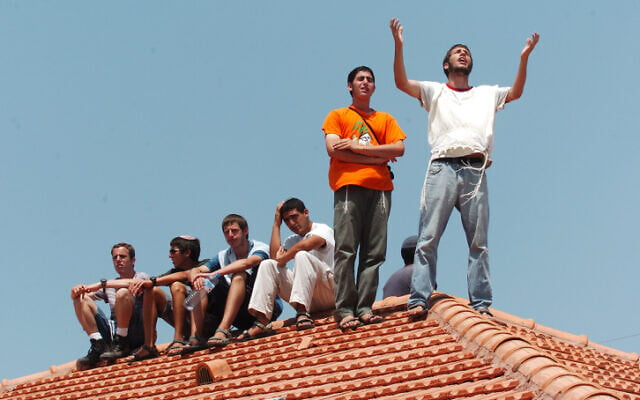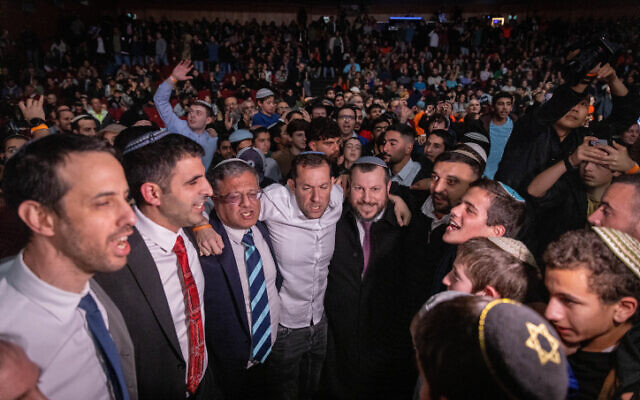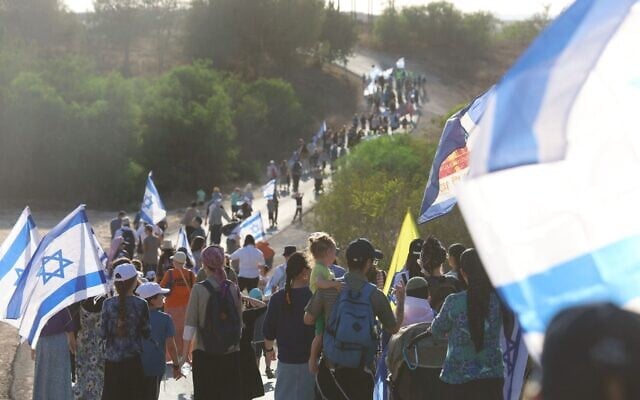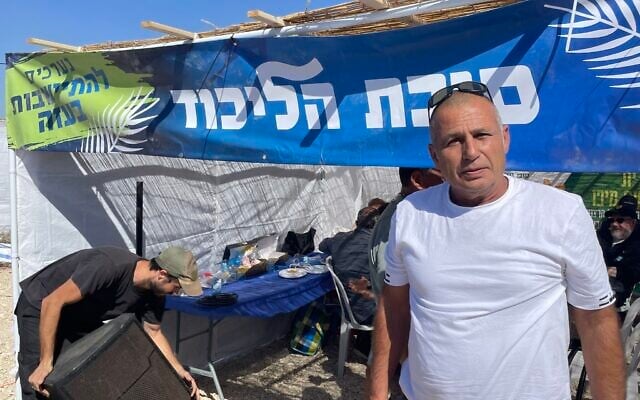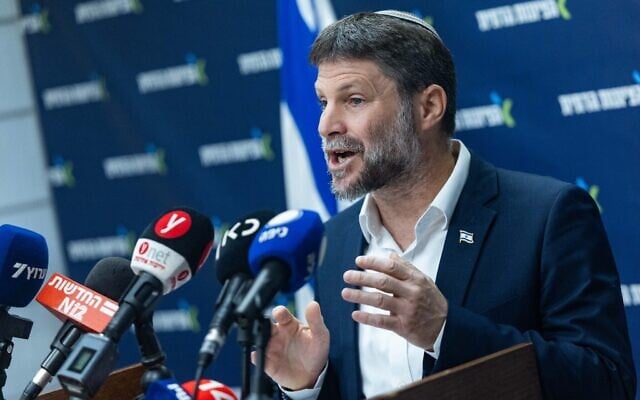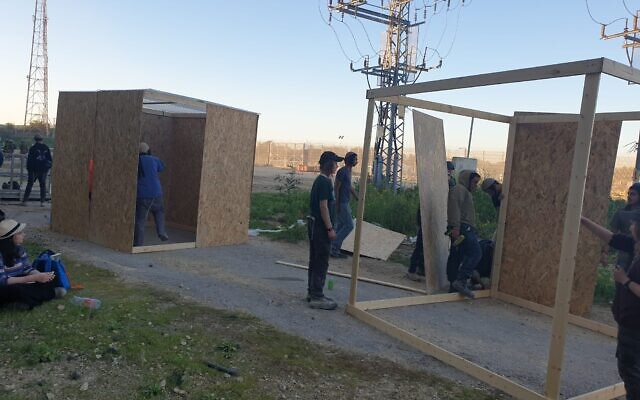



On August 17, 2005, thousands of IDF soldiers and police officers descended on the settlements of Gush Katif in the Gaza Strip and began forcibly evacuating the residents who had refused to leave voluntarily, as well as several thousand activists who had entered the settlements to protest their evacuation.
The Disengagement from Gaza would become a severe and indelible trauma for the settler movement and the broader religious Zionist community in Israel, constituting a retreat from what was until then seen as the inevitable march toward the religious goal of the full redemption of the Land of Israel.
It was in this crucible that the ideology of many of the political leaders of today’s settler movement was forged — an event that created a steely determination among many of those politicians to shape the future of the country and its policies toward the West Bank and Gaza according to their vision.
Today, 20 years later, the movement to reestablish Jewish settlements in the Gaza Strip is riding a wave of popular and political support, enjoying backing from large swaths of the public and some of the most senior and influential politicians in the country.
The impetus to rebuild Jewish settlements in Gaza began almost immediately after the invasion and atrocities committed by Hamas and other terror groups on October 7, 2023, when thousands of terrorists burst across the Gaza border and massacred nearly 1,200 people, the majority of whom were civilians.
Ayelet Schissel, a spokesperson for the Nachala Settlement Movement, which has spearheaded the campaign to rebuild Jewish settlements in Gaza, says the organization began planning to advance this goal in the weeks following the devastating Hamas invasion and massacres.
Activists from a collection of like-minded organizations gathered in the moshav of Shavei Darom, 10 kilometers east of the Gaza border. They met at the home of Rabbi Avik Schreiber, former head rabbi of the Kfar Darom settlement in central Gaza, to discuss how to proceed.
At that meeting, the activists, including Nachala leader Daniella Weiss, decided to pursue a two-pronged strategy: lobby the Knesset and government through various channels to advance the goal of resettling Gaza, and at the same time embark on a grassroots campaign to build public support.
To an extent, promoting the idea of resettling Gaza to politicians was knocking on an open door, since key coalition members are settlers themselves, from right-wing, religious parties that have historically promoted settlement and strongly opposed the 2005 Disengagement.
The heavy representation of religious-Zionist MKs in Prime Minister Benjamin Netanyahu’s Likud, and the nationalist sentiment that prevails in the ruling party, meant the Gaza resettlement movement was able to secure support from that key section of the coalition as well.
The broad support for the enterprise would be demonstrated just a few short months later.
Following the meeting in Shavei Darom, Nachala began a series of public awareness events for building settlements in Gaza, starting with a conference in Ashdod attended by several hundred activists. This was followed by a boat ride off the coast of Gaza during Hannukah at the end of 2023 with a candle lighting ceremony, and then, crucially, by a major conference attended by several thousand activists and numerous hard-right politicians in Jerusalem in January 2024.
The January conference was perhaps the first time since October 7 that the dialogue around building settlements in Gaza broke into the mainstream, as numerous Israeli and foreign media outlets reported on the event, even prompting diplomatic protests.
A festive and joyful atmosphere prevailed over the conference, with participants, including key politicians, celebrating the plans to rebuild what they see as the lost paradise of Gush Katif.
Superstar religious musician Aaron Razel performed at the event, where several cabinet ministers and MKs danced jubilantly with the crowd, in scenes that were widely criticized as insensitive and inappropriate to the national mood just a few months after October 7, with many hostages still languishing in Gaza.
Eleven cabinet ministers and 15 additional coalition MKs publicly signed a declaration at the event supporting the reconstruction of Jewish settlements in the Strip.
Far-right Otzma Yehudit leader and National Security Minister Itamar Ben Gvir went even further, advocating for “encouraging voluntary emigration” of Palestinians from Gaza, while radical Communications Minister Shlomo Karhi of Likud went further and advocated for the forcible transfer of the Gazan civilian population, numbering some two million people — a war crime under international law.
It was at that January event that Nachala first announced practical plans for its vision of new Jewish settlements in Gaza. The organization said then that it had signed up four hundred families, organized into six cadres, each of which would establish its own settlement at different locations inside the coastal territory.
Schissel says that by now, the organization has some 1,000 families signed up. She says they are ready, at a moment’s notice, to set up settlements in northern Gaza, deemed the most likely area for settlement at present. Among them is Likud MK Nissim Vaturi.
Schissel also points out that the members of the cadres are not only from the religious-Zionist community, and include secular families and families from southern Israel who were affected by the last two decades of rocket fire from Gaza as well as by the October 7 attacks.
Schissel herself has a deep emotional connection to the vision of resettling Gaza. She lived in the Netzarim settlement in northern Gaza, just a few kilometers southwest of Gaza City, in 2005.
Although some residents agreed to leave during the Disengagement without being forcibly evacuated, Schissel remained in Netzarim until the pullout began on August 17, 2005, and was one of the thousands of residents and activists forcibly removed by security forces.
“After the expulsion from Gush Katif, which the entire religious-Zionist community, as well as other parts of the public, immediately understood was a mistake, the will to return to the Gaza Strip, to return to that part of our homeland, always remained with us,” said Schissel.
“On October 7, Israel received a severe blow, and the attack was the direct result of the expulsion from Gush Katif. If this blow was a result of the expulsion then we believed it was time to go back, to rectify the mistake, and prevent a future October 7.”
The January 2024 conference was followed by a series of other major set-piece events, including a rally close to the Gaza border organized by Nachala and allied groups on Independence Day 2024, that organizers say was attended by some 50,000 people.
Another rally at a separate location on the Gaza border during the Sukkot holiday in October 2024 also drew crowds, and marked the moment when Weiss began to talk openly about the desire to transfer Gaza’s civilian population out of the territory.
Just last week, some 1,000 activists marched from Sderot to the Gaza border, demanding to conduct a scouting mission inside Gaza to identify suitable spots for settlement in the northern part of the territory. They received the backing of six cabinet ministers and 16 coalition MKs.
Other organizations have also contributed to the campaign, including a group of activists who established an ersatz “settlement” a few kilometers from the Gaza border called Elei Aza (Toward Gaza) to demonstrate to the government their willingness to build within the territory.
Several recent opinion polls have indicated that the public push has borne fruit.
A survey published last month by the right-leaning Israel Hayom daily found that 52 percent of Israelis support reestablishing settlements in Gaza, although it was not clear whether the survey included Arab Israelis, who are nearly uniformly opposed to the notion.
And a poll conducted for The Times of Israel in late July found that only a small majority of Israelis, 53.2 percent, reject annexing parts of the Gaza Strip, while 38.9% support such annexation.
A poll conducted by the Israel Democracy Institute in November 2024 found that opposition to Jewish settlements among the general Israeli population stood at 58.5%, with proponents at 36%.
This level of support clearly exceeds the boundaries of the religious-Zionist community, which at most comprises 12% of the overall population.
Indeed, notable at the Sukkot 2024 rally was a large delegation of Likud ministers and MKs, which included Social Equality and Advancement of the Status of Women Minister May Golan, along with MKs Avichay Buaron, Tali Gotliv and Ariel Kallner. Likud was also one of the organizations that built a sukkah at the event in solidarity with the campaign to resettle Gaza.
“The Arabs must lose territory in the war, so that they remember that they lost,” a Likud representative from a Tel Aviv party branch told this reporter at the event. “For an act like this [the October 7 massacre], they must get the punishment of losing territory.”
Despite the impressive gains the movement has made among the general public, one key player who has yet to be won over is Netanyahu, who has said on several occasions either that establishing settlements in Gaza is “unrealistic” or that Israel will ultimately leave the territory after the war.
Just last week, Netanyahu told American cable news network Fox News that Israel wanted to establish security control over Gaza but that “we don’t want to keep it,” and that “we don’t want to govern it.”
At the same time, Netanyahu has long avoided formulating a plan for the future governance of Gaza without Hamas, with critics accusing him of seeking to avoid a political crisis with his ultranationalist coalition partners Religious Zionism and Otzma Yehudit, which support the vision of resettling Gaza and vehemently oppose handing over control to any Palestinian entity.
His comments to Fox News, as well as last week’s decision by the high-level security cabinet to launch a new offensive in Gaza City but not to fully occupy Gaza, predictably prompted rebukes from the pro-settlement movement. The sharpest response came from Netanyahu’s pro-settlement finance minister, Bezalel Smotrich, head of the Religious Zionism party.
Smotrich said following Thursday’s security cabinet meeting that he had “lost faith” in the prime minister’s ability to bring about victory in the war against Hamas, adding that this victory needed to include the “annexation of large parts of the Gaza Strip and opening its gates to voluntary migration.”
For all the success of the Gaza resettlement movement, the failure to bring the prime minister on board remains a major stumbling block to the campaign’s chances of success.
In the West Bank, the settlement movement has often relied on establishing facts on the ground by creating small outposts in advantageous locations and circumstances without government approval, and then pushing toward legitimization and authorization later on.
This would be difficult to accomplish in Gaza right now, with a massive IDF presence in the territory, including on the borders and at crossing points, which prevents the establishment of the kind of wildcat settlements that are built by hardcore settlement activists in the West Bank.
One such attempt to enter illegally was staged by activists after a Nachala march to the border was thwarted in February 2024, and included an effort to establish makeshift structures inside the area of the Erez Crossing from Israel to Gaza.
Seven people, including a minor, were ultimately indicted on charges of entering a closed military zone over the incident.
But Weiss herself managed to enter Gaza illegally in November 2024 to survey sites for potential Jewish settlements. She subsequently told the Israeli media how she intended to establish settlements in the territory without formal approval, by latching onto locations of Israeli military presence and setting up civilian communes adjacent to them that the government would ultimately recognize, as has so frequently happened in the West Bank.
Ultimately, any agreement in which Israel agrees to redeploy the majority of its forces outside Gaza on a permanent basis — as Hamas is demanding in negotiations for a cease-fire and hostage deal — would likely end the movement’s hopes, at least for the time being.
Yet Weiss and her Nachala movement believe in the long road to achieve their goals, a fact that she has underlined on more than one occasion. At the October 2024 rally, Weiss boasted of what she said were 330 settlements in the West Bank established since Israel took control in 1967, and declared that the settler movement would do a “copy paste” of this modus operandi in Gaza.
“It’s only when we hold on to the soil, to the grains of sand, that the army will raise a white flag” of surrender to the campaign, she declared at the march to the Gaza border last week.

